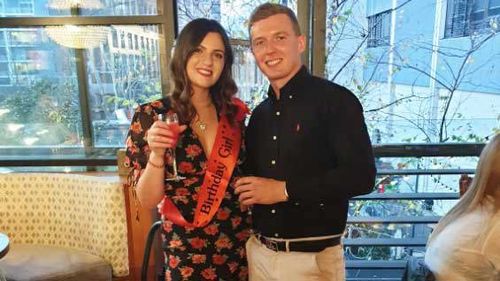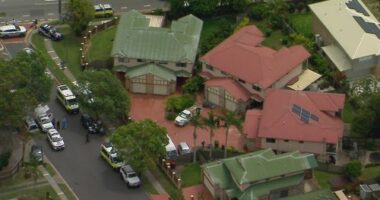Share this @internewscast.com
However, the couple are facing potential deportation in just a week, when Mathers’ current bridging visa expires next Tuesday.
Mathers, a marketing project manager and DJ, has been deemed an economic burden to Australia after she was diagnosed with multiple sclerosis (MS) at the end of 2020.

Mathers said it was unfair that the immigration policy was so “black and white” and did not take into account their individual circumstances, including her partner’s thriving business.
“If you look on paper at how much Rob and I have paid in tax over the years of being here, it is way above my health cost,” Mathers said.
“Also, Rob has 95 (immigration) points or something like that. So, they want him, but they don’t want him if he has got someone sick with him, it just seems quite harsh.”
Mathers said she and her partner should have been granted permanent residency before her diagnosis, having both spent years on sponsored visas, but legislation changes, occupation list updates and employer insolvencies had all contributed to setbacks.
Furthermore, while health waivers were accepted for some permanent visa options, they were inexplicably not an option for the visa O’Leary had applied for, she said.
The report found almost 2300 visa applicants exceeded the significant cost threshold in 2022-2023.
The total estimated costs of the health services hypothetically required by those visa applicants was $1.06 billion.
However, the 30-year-old policy was not in tune with medical advancements and prevented some people living with stable and managed health conditions, such as HIV, Crohn’s Disease and skin disorders like psoriasis, from being granted a permanent visa, the report found.
The review also found the migration health waiver could be applied more equitably across permanent visa subclasses, and that children with health conditions could be given special consideration.
Mathers and O’Leary said they desperately hoped the minister would review their case.
“We want the opportunity,” O’Leary said.
“We’ve got dreams here, we’ve got a future, and we just want a fair go to be able to make it happen. That’s it.”
A Home Affairs spokesperson told 9news.com.au the department could not comment on individual cases.
“All non-citizens who wish to enter or remain in Australia must satisfy the requirements of the Migration Act 1958 (the Act) and Migration Regulations 1994, including identity, health, security and character requirements,” the spokesperson said.













